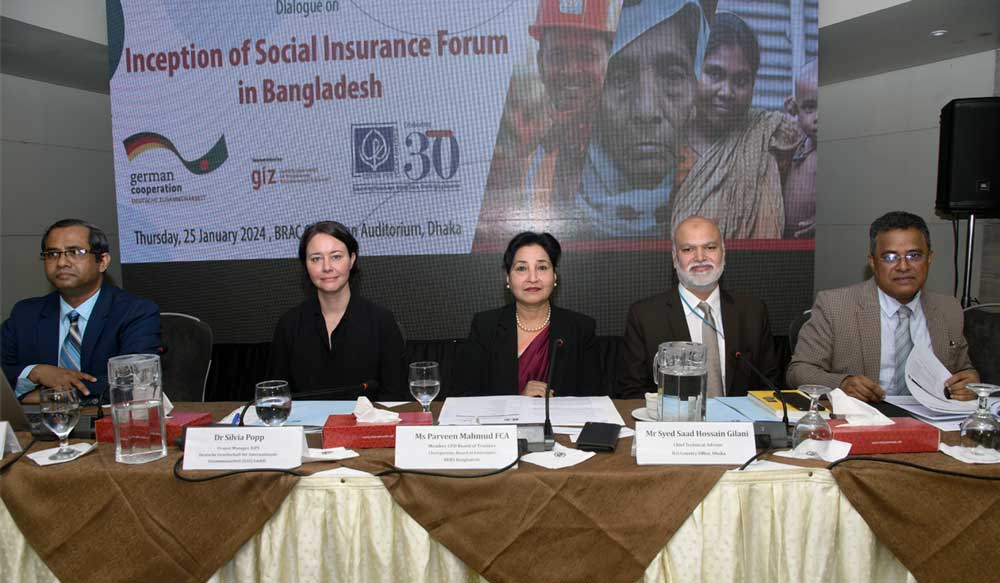
A forum has been established to facilitate the implementation of social insurance scheme in Bangladesh. Social Insurance (SI) is a government-backed initiative that offers financial aid and protection to individuals or groups facing social risks like illness, disability, unemployment, old age, and maternity. Its purpose is to alleviate the economic impact of such events on individuals and families.However, a suitable design for the National Social Insurance Scheme (NSIS) is yet to be developed.
Although the ministries are consistently organising regular meetings and workshops on the National Social Security Strategy (NSSS), there is still a notable absence of widespread discussions specifically focused on the NSIS. Additionally, the visible progress on the implementation of NSIS seems to be limited or not readily apparent. A pension scheme has been introduced, but the level of participation is currently insignificant. There are several gaps in the implementation of NSIS, including conceptual gaps, legal and planning gaps, institutional gaps, operational gaps, among others. To address these issues, the Social Insurance Forum (SIF) was established. The SIF is committed to discussing these gaps and implementation challenges, aiming to provide insightful recommendations for overcoming these hurdles.
The SIF was established by CPD, in partnership with Deutsche Gesellschaft für Internationale Zusammenarbeit (GIZ) GmbH, under the initiative titled ‘Establishing Social Insurance Forum (SIF): A Platform for Discussion on Implementing NSIS’. The main objective of the SIF will be to facilitate the implementation of the action plan with regard to the NSIS. In this context, the dialogue titled ‘Inception of Social Insurance Forum in Bangladesh’ was organised on Thursday, 25 January, 2024.
Ms Parveen Mahmud FCA, Member, CPD Board of Trustees and Chairperson, Board of Governors, RDRS Bangladesh, chaired the session and highlighted ‘Introducing social insurance in Bangladesh has numerous advantages, such as preventing specific groups from falling into poverty and safeguarding against income loss due to factors like old age, disability, and unemployment’.
‘Social insurance is for everyone; it is not only for the poor because each one of us can experience unemployment, sickness, and aging’, said Dr Silvia Popp, Project Manager, Employment Injury Protection Scheme for Workers in the Textile and Leather Industries (EIPS), Deutsche Gesellschaft für Internationale Zusammenarbeit (GIZ) GmbH in her introductory remarks.
In his keynote presentation, Dr Khondaker Golam Moazzem, Research Director, CPD, underscored ‘The SIF aims to bridge knowledge gaps, facilitate framework development, establish networks with stakeholders, and track progress in thematic areas.’
‘The knowledge gap will be bridged by identifying and addressing gaps in understanding through the dissemination of detailed insights into policy requirements,’ said Dr Moazzem. Clarity on organisational and operational workflows will be emphasised to enhance comprehension and implementation.
To facilitate framework development, the Research Director suggested that a platform should be provided for collaborative discussions and idea exchange to enhance the creation of robust frameworks. Guidance and resources should be offered to streamline the process of developing effective frameworks aligned with NSSS objectives. Encouraging dialogue among participants will help ensure that diverse perspectives contribute to the formation of a comprehensive and adaptable framework.
Regarding networking with stakeholders in NSSS implementation, he suggested establishing effective communication channels and collaboration among key participants. This includes hosting events to foster relationships, share best practices, and collectively address challenges, aiming to create a cohesive community with a synchronised approach to social insurance initiatives.
‘Several countries with lower GDP and per capita income than Bangladesh are successfully implementing social insurance despite constraints and are reaping its benefits. Bangladesh, however, lags behind in this dimension’ underscored Mr Syed Saad Hossain Gilani, Chief Technical Advisor, ILO Country Office, Dhaka.
Mr Arinjoy Dhar, Senior Director, BRAC Microfinance, said ‘During crises like the COVID-19 pandemic or the death of a breadwinner, poverty exacerbates. It is crucial for individuals to have multiple income sources to better cope with these economic shocks’.
‘Insurance currently covers almost all age groups, except for individuals aged 15 to 69. We still need to think about how this age group will be covered by social insurance’ said Mr Aminul Arifeen, Programme Manager, Social Protection Policy Support (SPPS) & Acceleration SDGs, UNDP Bangladesh.
Mr Muhammad Musharraf Hossain Bhuiyan, Former Cabinet Secretary, Government of Bangladesh and Senior Advisor, BIGD, emphasised the significance of inter-governmental coordination, as well as coordination with development partners.
Commenting on the barriers of selling insurance products, Mr Shubasish Barua, Head of Impact Business, Green Delta Insurance, said ‘In Bangladesh, we encounter various religious and social taboos, and as a characteristic trait of Bangladeshis, we exhibit resilience and a lack of strong interest in insurance products. Now is the time to eliminate these barriers, both on the supply and demand sides, and foster a more inclusive understanding of insurance’.
‘Distrust in the insurance industry has grown due to cases where individuals lost their money without any corresponding reimbursement,’ remarked Mr A.B.M. Sadiqur Rahman, Deputy Secretary, Ministry of Social Welfare, Government of Bangladesh. He said that even though those responsible for the mismanagement are now behind bars, the affected individuals continue to face the challenge of not having their funds returned. This lack of restitution has significantly contributed to the prevailing skepticism towards insurance services.
High-level policymakers, diplomats, foreign delegates, researchers, development practitioners, business leaders and representatives, worker representatives, civil society representatives, international development partners, and journalists participated in the dialogue and shared their valuable insights.

